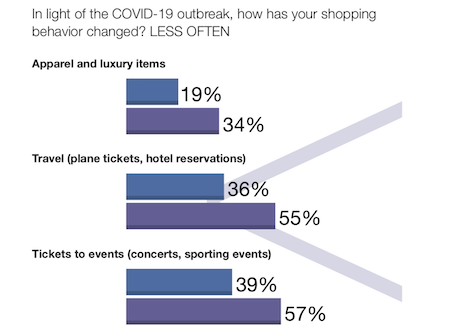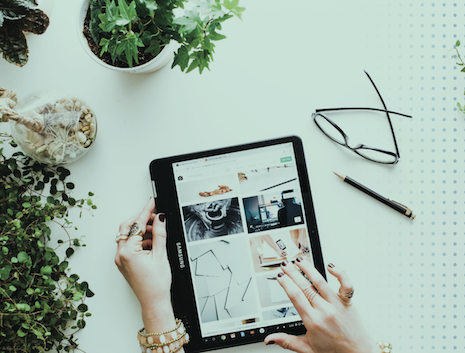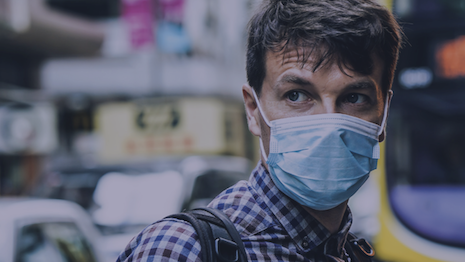Consumers are hesitant to make purchases as they fear for their health and economic situation amid the ongoing coronavirus pandemic, which is also negatively impacting the sale of luxury goods.
Half of consumers have reported that their incomes have already become compromised as a result of the lockdown measures COVID-19 outbreak, according to a new report from Astound Commerce. Seventy-seven percent of consumers are fearful of the economic future.
“Consumers have been in survival mode and this reflects their mindset during the height of uncertainty,” said Renata Akers, senior digital analyst at digital commerce specialist Astound Commerce, San Francisco.
“Once restrictions have been eased and we are no longer in a state of emergency, consumers will begin to feel more optimistic. Consumers might also have less expendable income as a result of this pandemic and will initially be more cognizant of their spending habits,” she said.
Social anxiety
Many consumers report spending their days reading social media posts and news feeds, but this only helps to fuel their anxiety about the virus and the bad economic outlook.
Some 72 percent of consumers said that conversations with family and friends online do little to calm their fears. Sixty-three percent said that these engagements give them a sense of angst.
“Social media can be ripe with misinformation,” said said Kylee Magno, senior digital analyst at Astound Commerce.
“There you have an ecosystem where each individual can post their fears and anxieties and it becomes multiplied," she said. "There is nothing that acts as a countermeasure to temper all of the negativity so it can be toxic at times.”
As people are sheltering in place at home, many are spending hours on social networks and watching broadcast television where COVID-19 is dominating.
“Whether it's watching Instagram tutorials on how to sew your own facial mask or Pinterest boards that once contained your favorite cookie recipes now replaced with recipes for hand sanitizer and do-it-yourself disinfectant wipes,” Ms. Magno said.
“It can become overwhelming and cause anxiety as it doesn’t seem there’s an escape from it,” she said.
 Consumers have cut back on luxury items since the pandemic outbreak. Image courtesy of Astound Insights
Consumers have cut back on luxury items since the pandemic outbreak. Image courtesy of Astound Insights
Utilitarian value
While some consumers find shopping to be a pleasant distraction, under the current circumstances many are cutting back on purchases.
Consumers are buying fewer luxury items under lockdown, according to the study.
Thirty-four percent of those surveyed said they are shopping for apparel and luxury goods less often since the pandemic hit, which has increased since earlier in March when only 19 percent of people said so.
When consumers do shop, they are looking for utilitarian value in purchases, per the report.
The perception of basic value in consumer goods has shifted as an outcome from the pandemic.
“When the crisis hit, the playing field was suddenly leveled,” the report said. “It didn’t matter if you were wearing Gucci jeans or Levi’s—the important thing was that you had a pair of pants to wear. No one is checking your label when you are stockpiling toilet paper.
"Brands like Timberland, the North Face and Ice Breakers are going to increase. They’re high quality, and they’ll actually help you survive a crisis. Luxury and fashion brands that have no additional utilitarian value will take much longer to recover—if they can recover at all.”
 "COVID-19 and the Consumer" by Astound Insights. Image courtesy of Astound Insights
"COVID-19 and the Consumer" by Astound Insights. Image courtesy of Astound Insights
Creative marketing
In these uncertain times, luxury brands should be connecting with loyal customers and offering soft messages that help boost their morale.
“Marketers need to get creative by using social platforms like TikTok or Facebook Live and newer technologies such as Zoom or Slack to connect with younger shoppers,” Ms. Akers said.
“But authentic messaging is key," she said. "They should acknowledge the current situation and be more customer-centric in their approach.
"Customer service is the foundation of luxury. Showcase how they are helping the community and their associates, if applicable. Consumers will reward those charitable brands.”
Additionally, luxury brands should be offering free shipping and generous return policies to show goodwill at this time.
“Offer curbside pick-up or contactless delivery,” Ms. Akers said. “Create themes around things that currently matter to consumers, like items that fit with a work-from-home lifestyle.”
 "COVID-19 and the Consumer" by Astound Insights. Image courtesy of Astound Insights
"COVID-19 and the Consumer" by Astound Insights. Image courtesy of Astound Insights
Retail therapy
While there will likely be an initial impact on the luxury market due to the COVID-19 lockdowns, Astound Commerce's report suggests that it will bounce back like it did after the downturn of 2008-09.
Once consumers feel safe in the store environment again, they will slowly return to stores again. The report suggests that it will begin with younger generations who crave the socializing aspect of shopping.
After isolation, consumers looking for a sense of normalcy again will likely head to stores, even if only to window shop at first.
“The luxury market has a more engaged and loyal set of customers, coupled with brands now having more direct relationships selling to consumers and more control over their inventory, which will help them survive and thrive,” Ms. Magno said.
“When consumers buy luxury goods, they are buying into a lifestyle," she said. "They may cut back on purchases, but will never eliminate it altogether.
“For some, it’s a way of life, and for others, luxury items are a way to treat themselves and lift their spirits. After undergoing limited activity for months on end and mainly purchasing essential supplies, people will want to splurge. Retail therapy is always the best therapy.”
{"ct":"3lk\/NP7uq31w+SVB8SE34u1Q1HVkx9h7Y1PIsqtH+5klTm\/HE6KSCdoUwk\/FWMw7HwDrtXTgu7RkClmVIIZCAdI5Q5EXAnPmwueMuFZug0i\/dws3i6MPii4\/smZ08fhbaxlZLKRu\/XN49a16Z1mCw2qNGAGJJPm5iYxTZds24ib0nz+njzWOI8BQtBGaAD5q01TvEFPIYc5O2eWgBxSlfJLquqruOgSZX8YTx2Q8q7qXtKefqgYiUj5SsFr\/dXbfSSKP6WFu8AkZvPq\/2Wc5EI\/juSWAR1jxfwR1MvlSzw2zGMsgOoy+FpBirQyUlSgKtLduwlCxP1fMMJCFnfc\/qki3u3Pb+OvaE63sL2gG7NKREhvMUx8MoXwwbQLaiHeV0Qq6wsJQ95wu4TLarcp7bAO5IPTDJgzjr5zoo3OyIESRa3kqnknTEpfydnw9VZMwk4Lzxd7E+CJAWWm+JqjSg46nqIh4xPVEE273PRlbUWNHNJ0yb2jWOw9W0pmypWXGZssQ2FSLAv4b8MdoY6N4upa6G9XoI2aPYkZIUShlNPVQvjxQ\/g01jdfpaTFJg0QnWtHehfKF\/r7mK4Z974EfYHkia1TThtDPUzjMVwrZzCYfy0hItu7PHyFKqY68d8jfxxe6KF\/XcJFfHnhrRzdGwhQcJxU9SL3785XJPqBWpCXtg+DJt10ZcvmUqs8P72DWYZnmuKi0B1hOx0WyK3Fe2HbcodCvJZmz8motAxF9LI1vw\/CrAO5c\/Kh9jEtHppg5ZyGlPhAtwQoVkHvuWu7buBZzRnnSRrXHHv++y8AiKZ2wQUw23V6HD55x+bpw69KliP8AISO80s62Yqr1rieuaXgZgNpknx9C6sl+S9v0Uc82LNW9IxjkZp6swE\/Y+jj+50i51PQZpGWa6lBG\/bPgi7\/BYblBn1c\/hGI3HtLMS7DwWn6cAcqCynoksVRMr8ySueXUDXV7IFOSMyV8RA22EYqSELDqXSoTHLtDYy7zVrI4K2UGjd+8GsUKGxH\/sjE+M3kI\/FlCtHfQy5fqW0n0\/8ih1io6jwxFmV6RMfNsSGDuUMzPROcHXy5bljUL0xxVCBSxceMNuekso9uzCT+P8FGXY7zDgUpYg6LFRn0szyg2IVEmVZEn9xPVJknJ4QWHpr2lvkeaf13qrK494TZLImceZVcxm4r0suNlgM9GX\/puv5MVbPlBF+ZACoMKEwT9HjQvRRNfglv5lSuTkY0f1Sr5y2HRr9I4CT+bNCUaFFdknIUA+V+J\/l2n10o7svg6i6ujVtYYXs1IzAwh88KwydOGyGtm9RND8byxox+tcsSZivfbW12MzLqd7XNXlThQH+wH9uKmJ8m0xB5dTNrLh7i5u01a0NXmXhXAA0SoywyYqPTuQyoGgNUdKbP\/cdnomTLT+vt5kWew6KfDhtxWkC2FENPv2sHg1XeFlqE55t93\/hUEEW\/gJAjyCuli3rGcNyMtjjFLwF97pUnG8xo\/HwZiZamvV1IlhqqTD5B9A8zspMlUp6HsLRnvGwAGZH4R2tPNVjneqvomSUwqsf8vV9E0hdmA4Hhw6ULonRoCle05Yg2\/\/WQ7bMjlNk5L+5hoHfHZo9sPAH1mk3Rs7Pi3Tam6D+XChktVNlgUwyzB7ZX1h5Yt9LLSxXopNwY0EXPMVJa00lsms9arXXhK\/naDcgjCqpJYdkkT34NuopwJcc4elzt5gH4gSGTc5FzxnPIlFjjYIey9sc9qfyt6+ci37rHmv5nXViC\/nXPn+V3Vzp7m4ukI2hjggr6TQpQ4hDPz2sfxVaQIaR\/Gf6AylH5QEhs9vn51X0LdqRyfw58OP\/n7LXQWP6dm2suM40Fl4q8S5x9YTlohyMsGeZjoWpwcDCygcJ2DYN9PCeEUWrTOaJgpC4exhRlLD2NE1uEDoDuYc50XGh1o4+ZLgNuNkndDRZkUdWsRmQn4+mNSHzNMmPsYUY4LufdcB1YNjc6Eel3pKUHFSMwScGaDvpAeOjP3VzihtKhG6eUvtA5JNrLi67zcrjAdEsrpH7YZYuP3V0nRsmsJsQGeAZU++pvQ\/U8kMNgcDriCWikX5raoZHl7hTCz0ov13ZuofFlVF93waZMX54W2Yl2gftt8qgc1eCQGjcXVozT6x3jwZqFqrlphr4aZayXhLyPjfUg6v3btZu+y0XylmAe8shrcd5hiW5eQ21kSj1z0gFfEPhefPPbStwSWBkfuin998Hx0nMUVsDssTWN8Dw2YyO8TkjoIAsHGOqBUnqEFS+cFX\/QBEYK7J\/lOcCbzVViPGlVvR2QHtbfXsVLLHcOKh3wXti82O8LqT6bhNZt8McCV5ZVbPrrYF6xZwHe45S\/BoIf7J6+TNrRTyFKblraSoTHOxicfEzBawVxhxJ0HrtBKii7Y7GbsqoWM6awz7VKgrNEIDaiyLAX68\/T+gUszBnRGw5x2MqRnlpPsjMxO3BGIjrNLgSEnXUYLwcs9EcGe0cw9A2n3xh+huMjJbu1Xo1V5B9VYbOh5rdHLV7zYK0xe09Wvj5DXlWbO6DwP0WmhLtIw\/3oL6KuxIc02N+m26h+EkmDLMxxlLxc2ro75tTbreZLF53aXbFQ80g858OefuI+IrfZ97crP1TMHcevX00bvplj9spziZyu\/cqtqVoTzuiWfb\/EJPkKXDcdKnnZQwfeOVZrr8jMfn2uEAaXcsftZrAPLs3q69tqaDvdBvLiqU06aCs6Ux6+naQKaUd19k5gfYMR2+X7yLMha0GN9dlp7rT53k4Fkyw1a0ZEBRQnglg5EKEIra+5SZBxDpw4bC2p6mLiPvPd+HYcjLVGsyEuQwSet3ptSK9U3hHqdvuiYqcIK08V8MOQKETKdlalK3NT7uB\/N43pOyS+RsYz5gJBWwU52otqZLeA4IKKP8oYEY\/78rNSwehr5CJOPe2iJ0vSMGkzg0PcIFApvhvmnNUbhxnSjQwH6X\/N5enn6EtZDhjssfEctUnj3S8KCFMeaMpu\/5AeY2lh+dwUzrXL3tHcSHKu7Vt2bJbzLpzfOZVQ\/fbNpkw4Wq46GRb+c6O3qoqwkkim5likXkPTtKRKNyAzNhp7lRWMexdrw0S80mHpZygD0Zw3MIu\/mYS8GnPksFSazH9VVBYRAC4McUa2XWolDab0MRnfKS09kV5ErjjtbqyUTvgtY9odWzWhvkSPpCM6tCxZylpFltcjtK9z720x3hjTu74QXia12TsXtveneh\/+mIaNJ34ar7OV2\/L2KE0ehxdLVJJGXnCydLML4N2R1UrIqjpwyY+LP\/yE12isCE+kjz8ziFqLofGPwrEOtgotj\/rhKqpd\/3lnFaeKeZjxZ75rpCGApJSFVddNbPKtOgVn\/im5RdFNQykQ4wSBPfZaRQNL6Kmp3Y32+ZpDL1ecIEI+0gc4g\/1FZri2JITb3HJvEeE3N8W3tOpl6XC2YeXVR5\/uDw4UDoRJE9fwsuV9QD457KaxsQouUa4Q68vksjd8FSUPv+ktBbTP\/bZ7JlRfQ3qpKcKNIsIBtiFf1LpxW2eeGb1MVxI41xOG31FhFWLfoXOwlLkVj0P3YfvKfQcdhetZhrMIJI0oo0uKVZeUIfWLIcbkq+3fji6ziI\/ELZvcO2n7OmCpBuHLE0K3NIsiVoKnRZfLzQVr1H7Vgl6vUjHpUsNQm4U29uBcptvCYQcreLgK+yjQ9zmiJuOdlq0j+OOG0n8eSgwo8chDPKUvMpFpmdk6qhTXioMBWR9g\/euOH7eJCB0TXm9UbMiSgJEu8scr7nbsOqWyBAeX0etA2NtR2a+iXrw+75vj17+pfMqTINBBgxAsNGL+8pFksn5YCD4r5DkZeSAycECNWDCbMLHMdZAUEzY0pgqjOORmWNkW+JFVAwBpyn\/sgrBH0osrcyV\/WNJl7\/phedAz6TY39SN6aaX3UTm4GvEFFMH\/hJkP6OhoZ1IV\/GAqs7asY3dhgcPC7pR0v3xASJkOeu+MrhOGPdqvsjcb1rmrJGKRQPEPtWPI8sBbeL5FVzaWFcnmHmjxHi4dXEndAivpd2UrsOawyJJ9udto4+RnMB7yB3\/bEt\/FFqN0r4gD7dme0DEkR4UZlet3G6FJYdFmFrwU+oKnrtYkisp8gIYvIABvYNedJ6dEuP\/DT\/QDUnDSXfo6xBL\/YmFMURKPIY9VJE10hikBWTQI5MCgv4iWu3SoM6rdPWBpPSKdp6\/hJX+bXey3EjbLM5j8ap\/xt57Xz+Xm0cS6NUDR5cg4rnnPxQ2u7YQU0\/FUhLx74f4Ll8CTQozZo8SV3Nr+rObJPRbfEd4LfjXQ0PUkQ8gBWa5svoZpswOs0ySuNOqWQT3VSZLs2cCQ+7KB12GMvydbiHabdZPwmSgqN7vfxYk4p8ynZbN0JJHfrLOo2rsXmTbBKMe0yMtbG4zcjK6ZOKCU47knadQJQLZJYC6jIFHVfruzA4\/rREB9A4O4x7elGGpXbf7kZxMOSJpM93+lzG7OnWVbt14+LfcguvZJW+levcdduP7QFf7S2hLm4RPeIyUdkbuAQ1LYGZdGfarHgu1w1y4KwJSTkgD5qJzQapl5BgHtioBC3p0uU5FITi38igwTXGSc6dMw8fboRF8\/BTrJWAt3eP4fmqrAGPwqsU0cNDZChM0faPcrQqwFljWaigYuNMeq+WyY1VgYRafwmNIej9fGiYNS9XXuc8cemBs4ww2Ypr\/2Fp4rSYXxohjt3oSaAfTUmZJAOcieoZUZunBxVNlA4o\/R2pF2Lz8SV\/z44p0KGvW+rWW75NmZPdmJu+MUPDAvfPsbgq1JkIzkRsqIwiEEtSoXbvavUx8tBDu0o4nW\/d4dLqlIvb7ZnMqwqmxQyF0wH1HpRwCoXjfhDQMRaJVTgE2Ocg7Xw0yOkdXg8CUBEpg9MTbOxjg+mi7mKjes2M9e9JULOncFWNy3Nf1QWO6SyqZfUMV8ELWNN0EWDdokkdXFvpTLR3nX9cymwefQMk4iRfP+j7kMSyebw86fPawUS2qRHwdexYymqk2k5Q5WRi8tNoMEhWS5bNX+SpspP+rRWzttwOuchZ2ihxPijfLAMgxDc2HAkl0OGvBXIawUViVjQzKYYyKPpSKtL7N4r2ySW+GZ0JIa6e+7PxwJSC9vl\/\/cJ4W3SaE+NNIUgdZW9G5dkIZRHLo4ZNE71JUApxLc5J7Cs7jdSi1QsGrDfCzbfuAUlyREa1OIQEMecwM\/UGxXyhcEmeOp8lhyXepkbWdtxVwiLQ7aArL2Pc\/l02DtbzCh0YqT2Yfz9aipOsO\/y+sQTa3CdQRyxaZPig9uDDbH10T9zSMidBZYMOu9H4H40YFuOYZMWrm6sZ5FLKjHCRefsv0\/4kO543K2OQd3CjfhetdkMs3pjTEgmPNPMhEb8Dy9qs2IOvSJ2KCqcxtgBK9Lkti1mYv5Yv1xRsIvHh9\/5B08ms+5vKdUd58l+nSv+V\/90uRdSGdgI8ZT6vFA9HL1SYn7G9EkK0ThMAYMdQXjiKwZUu0nBka1hG5VdrwtvOCtHVjOtXB4AyKg8d3632QxHV\/1ed+qdnNp\/9CdoFpfVC0yefvR7WOyCQGN4boGhWpFvMSJzip\/020MCSOrUA9XAg5DILDCGqrfeCWcCbBguYzQ4CYgFAHulGL2kAa0W6NrqHk1qnEN2o7mLhZS3BiaxnnC3OeBFQPxyaukwPKkSAT11diLWfPkckIdG0JFaN\/rSj\/v9SVcV4Cgq4IU9oktBbAiBSkcUMh2dlRQkNj7LvpeRBYqSwIZpgc+iXDXaEACQnB8\/NBKxP1XOvomO0\/JmQ9ccnNuqdQaqxZnMx0a8jN8TPv3KIkV2OZsBP9bJiEz84bdpT3lsGTkWWiVCwqRYhOzpSo5KJ2SBdYD9yDbxdkj6fmKmMG\/9EXlFOx0uUnG7bN4GZ\/Ka+OQiTJty8IaJ1TaT7Ry+T+sfOe1X4ujoEeujg8U7y+kRZrUuCi03Iyjmju2rUOqE0lt5OK34gCyzw2moGybmHgqQkJ4DQAPbHwPZWphW\/YWmiUNAnhdajfBDJr+IKCsIhYxuqRnG32kMXYIodo9PCQBuU1H6pa\/YX13Kwc9Zhke9UtYSnn4mehENxXH4san\/cmA2mMO\/x6UrhX4a49mskBgP7Mj7rzNOcxXwr5BrdRcs9FMtuQSjzVWRXOX+1qqv2auYiSKaIUkPGKF9wJgQD0lj1ToMa86bOf\/UIwfUKBHTgvt3xyfdIDFd0iogv2BBs5H8YNRi0NrcvtvVFLmVZpLjd5xFlYlyCyUo2ZBqkXsPmg0QS3ScrxzzY5ANrKsa5rLo6jjy+qWuvhqDBOWgYHlgREP+WkLherB9Y6O5FopBlt6pMgRrWhCHHknbpafVv7CPTLMPmufqp+nbc92lld7BP5UXRw3IV8b17f4CiYkS43rCU9nj4iWn8i7Yn6ZBuNaBsXGdnAMnbFE6Y\/ApswnbNK6PrDfh62c8C\/aBTbCOkmk7dQe18TB3D9oT1q\/vcpLWTgMcW6gopW1Bh\/38NFOkGewSMbgkZjZ6VGxaeXFEH3XzG9lzsBNzVktZ6BqucYeZaCw9m1xH0QUuwt\/FeSh1TPjBZ3L6hZ8fK+Rj+OxS1xPts1edj7RSi8zkUm9059PsfxHK3TQ5+GpW\/5ifL+5nv2p\/uA6wKqH6qUk7+vIBkAuO\/tskwGpnbFzmTQcreNIKEkzJ7bvOiCSk1QOeGgWlETtSNcsQ0Qi7PKYePR8k7dVXbZSM+YCcVhErj5U7Sgn2cUtuiglsemhvPGCpfiQRIEDQOV9bt1vi2lvO7pEqEQkMF\/VmJ+cP7OTawBot7kT4bnRi7PKSaXZhi9mRJYPWf8QWFXpB5BDzJJOM2OtRE92G1z+7m9+J6kzYuy6TqPbgrjtWuVcsmipTqxz7qzW1GKY0duM0T5DyKDsqGdVYpL0xu3JBCLCVbbRbAiOB04SDnz71MBRMl1sP9DCYNYSk1KfiJCdRa+lt9OArdBEQm3MmWzL54rwFLC8mqzx\/wVaWDjjnrxvMPtxdjegvLS6wOHoTXnMRY4akVSgSDTWb2z0t37ImYqGTLOmqfHZvxyBtJ5Tx9oGWmigejsyVT4ILEfOv\/ZvunVWce2jEx9ik7JgyEnb18VjP0axmVYwY9qzNjpV6rK5TEoUoBq8ZouECVwVIld2lIJmGVZPrbdke9ioe+aANQOJUt9fanmXvBPxaNS1sroLfpmgXpelaUYmkJ25vEdr7Brjqfm09b76shg8kQPOT6wwuCvzE0qQhl37xCg+I50ADBszhpQCt0CeXxX5wQo49BON54+p0IKst8RdOPc2gpP\/Xje+wONV7wnfm8nrd0iTlCT9hSKLDwBpLzTmJIB0Q5HKWLpmcKbADHpsjb3iJGMiE6c5a1NpYvNuGbBIB5g+icvvApNuuq0dHCrUqkDAdmSVBgp3ZtkSiRSuvtBohSTHa8GiR4FYC+O5VEdlT6L\/NEK5IuqMAxSXjsU0RrH8+ntl0bn7v7mMieOcxw9Y\/lGWIzglmg1BrKcu9g0m795YvJrXOe5eNwXF+jAq2DLkxuDBXtMSugqzkZXEfaWouqsb4Tr88kvCDp6MUCeQcQo36SIWLCjxcv6D+ydAF4ZKd3qA1wY+FdIiW1ipmNa6f\/2kA06LIqeIuZ7xJ6qZ6Vp7ycQqGKE6CtKBAK21iXQzqaW+H0BmjPQLtdwCiCJ7yrTGsZTdjTrHbqv5+\/CWA5+NuOyPr3Kvt\/Djosu3SUtk+fBOfXeRgvZxACDA+EkmoHVbJ1Eoswk7O5W9oZkl4tEidzgNCIryFkK7cOq\/hkf\/YDKU3MRG\/yyQb78xh9EbRXnWVlL4L7e82YCZEzTb6xeUhCoHuU8OPfClUdh7gH3vsoo20kYUzCrjQwsNKilgt9bW65+rZSDM5PO7qGeLazNBrckX0j91V+pbDDgFAmwwP9im\/DhiAbLLQ\/CZnq61yaXY0txXxuanRnMpdulKqnRB4nz3Sx7CAPvXWpZiZkDXeGVyYk\/ob11gL5qSUaDTfr7sYlZ0oVhLObxCb+RayhVuHPzv0PGd5\/+rxvWtulwNM5EN6w7+5jyPsouNafhEsdUie1mynDSXV8mzZ2tMkT2jmHtzNT34ahrHOT4jker2eD+9W\/DY3aRK+DwT+ilbzxdi\/lDK33EMDLLl+9iO2yvVfevkqnj5DKPgAV9M0cO3BeVcobdkvEX5zRhnO0bP3pswm7HFklYgLDCF1iKICqB3OeM9Y2O\/XgyVoIpESLGZdnycl8Qs+22BHZRe087rZYgwJK8UK2KZuShInHrBaykuS894Uk4H\/XBONoxwBHd9pWv+QtyUYQS6Tp0KFAchAgJ5iiKi3ijWZpm4sLQfCio2W+Kd\/HHyz9S6K\/uG1nIcEQOlfUGyVSObIK\/zh3yHyG+yMjOpmCQ5seDdQqppn59VgeyfqynLC1cvjnfBnspzZPJ8urELVvUPWBUbdjmnSDKWtRdioNIwHYPTTkVTvXLMJnuL6rZ0YmWnV3xPYfeeF0pmZI7Sqv14niz+hDVknF3AyxFtgd6g5S04VdEy\/y6N3mlkUkxsME6Wl+rI2N4lsSzLK7w9FH6pbOf3BSaLctn\/izfehlIu\/w8ZQ1\/3AV5ShgBxtTxNRHcV5XBPDqhPSayK31r\/XDfzg6DEohKsMdljGnOhNy9fA2wF1rI0KH0UZavq8GjOmtkOqeje9qybJNjHm\/bpuRRBNqz\/\/aDM838ZuYywIzlDm4PztZA0DP8y4LyW2FDZeSNP5QK4kFiXoyYn1RkZcyny1Cf1t0R6ulf1\/rh+sUM8eczwGFaFecWAq3yAtbYiEQDOpuwu8jIGCStL9L7IOqUUNncmaQ7o2qAWQHA\/8HiDxak9UB967pa3dYpTxgPdl07mkGlEY3lXTh8mFFGQl\/u74m5\/OtB9msPzVWM6W53yRx2DnGUmSDnAXx1m71w5UGR1NEnUo2\/YMyjEc7CxrUh\/MUgezGx9WbyFeRonwHrBcV1fFi2NDqFdDNtTzEEA0pRViNKzJtBcpcO2\/Nw7C+eH1+nYbWAiTrCBLrWRy9r4fPjOSQltetOlFVKTR2AGMk3nZjZx4x\/1m1QaQQdXCb3aa4z2iar08MpepEOfeNAJGL1htc0n6nyQjVN9L+TNLxg9ro7YayxqnzFP6mW1eAllOemK1yhXaqT6d4eS1xCtKYca+bwxOUlK9x7JM6AropYnH+XOf5T5mMh1Z6FyDtUpjzDOhVD4eQkccW4OTol30k9zku9dPpENNKkiN6LrXUPkBYSyQAtvUU8lvS\/ny5rVpmshYzbOy4A2NQhmKXB+AYTppabYjO+jgeRnywUF8kSMmBhhnWtCyQ+2bBvfz6M9HjwiIHY8E9GiyRrzd37YZAV5enzzbosE16DIlgW8Ar2FucGWsdiX0EZRS4VS80KpnHhMp9DKelEHn15NPEbRIkq1iijGm2Xcp3J2OXcLU1t5nhbJr9rlI0o+hQC74TkFO2rm+jmDTSRI7BMmIwi1r\/Bz6y31MFrWTaf9cAokdFANCSGqHz0KzOCK3h00Z+sXB3KkIqn0pyNF1JsNwadYnoiXJejGCliYJsUITFJPN4gq7tUkXJgziXpx1s965TObsxUps1iSdXZbTVsgJTBJbt\/aYd\/jDsp\/xfsqo0K9qyVXcvRgCA95LhzuZdD+cSc\/dutt7rtefp47zlltM0DaWYcxlRoCBlnj8uJmSZYGkhg+zegEf7sqbD5KrkMiUyMdnBBCzpByqXewtyptsR1lpByrUFqvfAWe31MfUaTHn4R3OS7Y1bgOywxwg\/OgadDVFhh8VlROCNxfOulcwkAu4owN+tRX\/7j6BUP6ngZmzEuXI\/njGuawh5C0xPhyzrkc68Btd2sxxKvpe4jg1YefnqnfKK8U+ktVHOF2SHXcSIRn386LThvVlswBTFplZf0saa8qWtGlWD8yTGwlG4bH6eSCijgyM0YICXqS2Y74Qvr39Cuj3KJ0ebzXMgdLxGdBo2LjEmKqYOaCZiPOdUeyGlZYeZnBOg9m9nbem29hlAHe7bt8+6+UXvHx6CzLqs6QuCdSVr3RH4NikbaLTBKPSU2SrvBGxyymVcdqCph5+MnUixJ0HhBNPXXNBnA2oQiJ5w0V3BUn70lipmpWGwbY6dFEAtDH2rGcLHAQEDeYNYcrG94nVkQmQh5xSiP6Qd+uzDXhrK9AMrPCnU+UHs9Eitk6qSGqI+fCpxsfMrVZ\/XxLbf4WXRFd2e697PjkAW+kx\/pRu4BFJQHiCHjZyz5cQMd8lcfJhiBd27cHvCAW3P1usf3y3f6CV8cQSuOVtXc7imMkXciqHp6aPYrGNivmRWh33ei+s1OB3zXhpLNkAet7\/OW1Vg1BlUyMNb\/JKkNg99s5B95WLYCL9k7m3DrBDv5EVFo3xqev7jINbLYDFCSnp8dp415Aan\/GWr7bkWDOi3kqN0PJil2UwiuPBV\/2yJJjew9GioHGSIC4wqznQpkdopANPv7G7rz5ZMd+y6cUwrQM3bJpmfOMua2xFdmcooLgnZPZCpXtvlZkiL\/kfanecFjd09UsZJHb+D\/QXH1oa","iv":"5e79041d62c933ae9585b29c88acda34","s":"94ff0e5ea331a915"}

 Consumers are skittish in this COVID-19-driven environment, fraught with worry over their economic wellbeing. Image credit: Astound Commerce
Consumers are skittish in this COVID-19-driven environment, fraught with worry over their economic wellbeing. Image credit: Astound Commerce
 Consumers have cut back on luxury items since the pandemic outbreak. Image courtesy of Astound Insights
Consumers have cut back on luxury items since the pandemic outbreak. Image courtesy of Astound Insights "COVID-19 and the Consumer" by Astound Insights. Image courtesy of Astound Insights
"COVID-19 and the Consumer" by Astound Insights. Image courtesy of Astound Insights "COVID-19 and the Consumer" by Astound Insights. Image courtesy of Astound Insights
"COVID-19 and the Consumer" by Astound Insights. Image courtesy of Astound Insights